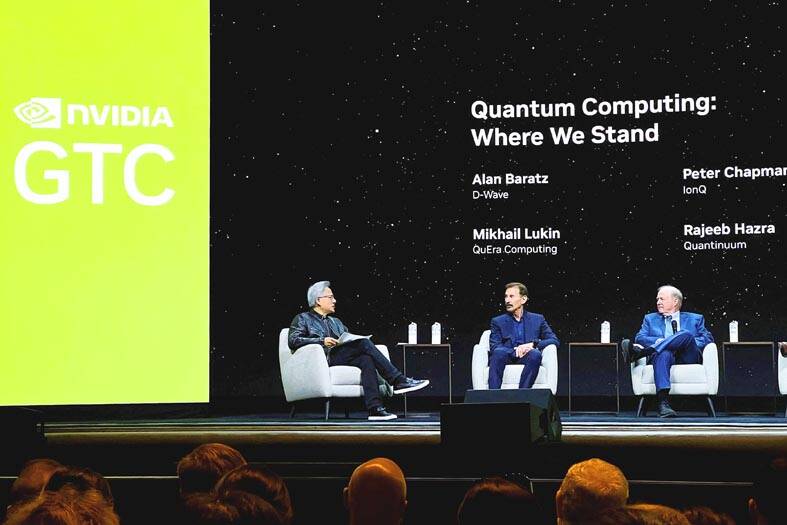Nvidia is to open a quantum computing research lab in Boston, where it plans to collaborate with scientists from Harvard University and the Massachusetts Institute of Technology, Nvidia CEO Jensen Huang (黃仁勳) said on Thursday.
Huang made the announcement at Nvidia’s annual software developer conference in San Jose, California, where the company held a day of events focused on quantum computing.
Nvidia added the program after Huang in January said that useful quantum computers are 20 years away, comments that he sought to walk back on Thursday while joined onstage by executives from quantum computing firms.

Photo: Reuters
“This is the first event in history where a company CEO invites all of the guests to explain why he was wrong,” Huang said.
Huang said he did not realize there were publicly traded quantum computing firms when he made earlier comments that caused shares of IonQ Inc and other companies to crash.
“My first reaction was, I didn’t know they were public. How can a quantum company be public?” Huang said at Thursday’s event focused on the still-nascent technology.
The quantum computing industry aims to use the unique properties of subatomic particles to process data much faster than traditional semiconductor-based electronics. The technical difficulties of building practical systems have meant that the field is still in an experimental stage. In addition to quantum upstarts, companies such as Microsoft Corp and Alphabet Inc’s Google are trying find practical uses for quantum systems.
The companies on stage at Thursday’s event included IonQ and D-Wave Quantum Inc.
Huang said it was natural for this new form of computing to take many years to develop since it was so novel. The companies might be able to convince him that quantum computing is happening more quickly than he expected, he said.
“But I don’t know,” he joked.
“This whole session is going to be like a therapy session for me,” he said.
The six company leaders on stage gave him a variety of answers. Some argued that quantum computers are already in use to solve difficult science problems. Others posited that the technology is even closer to helping advance traditional computing.
Executives also said it was not unreasonable to spend a decade honing a technology that will have such a large impact.
Pasqal CEO Loic Henriet said the term “quantum computing” was misleading.
Quantum processors will help act as accelerators — working alongside traditional computers — rather than replacing them, he said.

TARIFFS: The global ‘panic atmosphere remains strong,’ and foreign investors have continued to sell their holdings since the start of the year, the Ministry of Finance said The government yesterday authorized the activation of its NT$500 billion (US$15.15 billion) National Stabilization Fund (NSF) to prop up the local stock market after two days of sharp falls in reaction to US President Donald Trump’s new import tariffs. The Ministry of Finance said in a statement after the market close that the steering committee of the fund had been given the go-ahead to intervene in the market to bolster Taiwanese shares in a time of crisis. The fund has been authorized to use its assets “to carry out market stabilization tasks as appropriate to maintain the stability of Taiwan’s

STEEP DECLINE: Yesterday’s drop was the third-steepest in its history, the steepest being Monday’s drop in the wake of the tariff announcement on Wednesday last week Taiwanese stocks continued their heavy sell-off yesterday, as concerns over US tariffs and unwinding of leveraged bets weighed on the market. The benchmark TAIEX plunged 1,068.19 points, or 5.79 percent, to 17,391.76, notching the biggest drop among Asian peers as it hit a 15-month low. The decline came even after the government on late Tuesday authorized the NT$500 billion (US$15.2 billion) National Stabilization Fund (國安基金) to step in to buoy the market amid investors’ worries over tariffs imposed by US President Donald Trump. Yesterday’s decline was the third-steepest in its history, trailing only the declines of 2,065.87 points on Monday and

TARIFF CONCERNS: The chipmaker cited global uncertainty from US tariffs and a weakening economic outlook, but said its Singapore expansion remains on track Vanguard International Semiconductor Corp (世界先進), a foundry service provider specializing in producing power management and display driver chips, yesterday withdrew its full-year revenue projection of moderate growth for this year, as escalating US tariff tensions raised uncertainty and concern about a potential economic recession. The Hsinchu-based chipmaker in February said revenues this year would grow mildly from last year based on improving supply chain inventory levels and market demand. At the time, it also anticipated gradual quarter revenue growth. However, the US’ sweeping tariff policy has upended the industry’s supply chains and weakened economic prospects for the world economy, it said. “Now

Six years ago, LVMH’s billionaire CEO Bernard Arnault and US President Donald Trump cut the blue ribbon on a factory in rural Texas that would make designer handbags for Louis Vuitton, one of the world’s best-known luxury brands. However, since the high-profile opening, the factory has faced a host of problems limiting production, 11 former Louis Vuitton employees said. The site has consistently ranked among the worst-performing for Louis Vuitton globally, “significantly” underperforming other facilities, said three former Louis Vuitton workers and a senior industry source, who cited internal rankings shared with staff. The plant’s problems — which have not